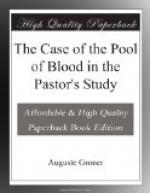This was the story of the early morning as told by the three servants, who had already given their report in much the same words to the Count on his arrival and also to the magistrate. There was no reason to doubt the words of either the old housekeeper or of Janos, the coachman, who had served for more than twenty years in the rectory and whose fidelity was known. The girl Liska was scarcely eighteen, and her round childish face and big eyes dimmed with tears, corroborated her story. When they had told Muller all they knew, the detective sat stroking, his chin, and looking thoughtfully at the floor. Then he raised his head and said, in a tone of calm friendliness: “Well, good friends, this will do for to-night. Now, if you will kindly give me a bite to eat and a glass of some light wine, I’d be very thankful. I have had no food since early this morning.”
The housekeeper and the maid disappeared, and Janos went to the stable to harness the Count’s trap.
The magnate turned to the detective. “I thank you once more that you have come to us. I appreciate it greatly that a stranger to our part of the country, like yourself, should give his time and strength to this problem of our obscure little village.”
“There is nothing else calling me, sir,” answered Muller. “And the Budapest police will explain to headquarters at Vienna if I do not return at once.”
“Do you understand our tongue sufficiently to deal with these people here?”
“Oh, yes; there will be no difficulty about that. I have hunted criminals in Hungary before. And a case of this kind does not usually call for disguises in which any accent would betray one.”
“It is a strange profession,” said the doctor.
“One gets used to it—like everything else,” answered Muller, with a gentle smile. “And now I have to thank you gentlemen for your confidence in me.”
“Which I know you will justify,” said the Count.
Muller shrugged his shoulders: “I haven’t felt anything yet—but it will come—there’s something in the air.”
The Count smiled at his manner of expressing himself, but all four of the men had already begun to feel sympathy and respect for this quiet-mannered little person whose words were so few and whose voice was so gentle. Something in his grey eyes and in the quiet determination of his manner made them realise that he had won his fame honestly. With the enthusiasm of his race the Hungarian Count pressed the detective’s hand in a warm grasp as he said: “I know that we can trust in you. You will avenge the death of my old friend and of those others who were killed here. The doctor and the magistrate will tell you about them to-morrow. We two will go home now. Telegraph us as soon as anything has happened. Every one in the village will be ready to help you and of course you can call on me for funds. Here is something to begin on.” With these words the Count laid a silk purse full of gold pieces on the table. One more pressure of the hand and he was gone. The other men also left the room, following the Count’s lead in a cordial farewell of the detective. They also shared the nobleman’s feeling that now indeed, with this man to help them, could the cloud of horror that had hung over the village for two years, and had culminated in the present catastrophe, be lifted.




